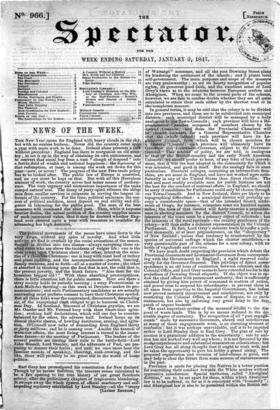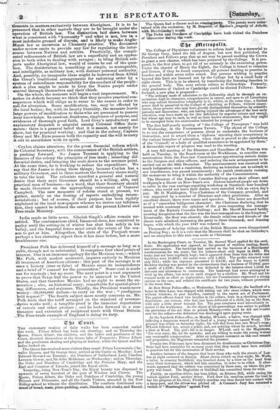Earl Grey has promulgated his constitution for New Zealand Though
by no means faultless, the measure seems calculated to be a fair opening to the true history of our great Southern colony, after the preliminary chapters of tragi-comic blundering. It sweeps away the whole system of official machinery and self- impeding sophistry established by Lord Stanley—all the "treaty
of Waitangi" nonsense, and all the past Downing Street plans for hindering the settlement of the islands ; and it plants local self-government. The main purposes and scope of the measure are very praiseworthy ; so are its hearty recognition of popular
rights, its generous good faith, and the excellent sense of Lord. Grey's views as to the relations between European settlers and Aborigines. When we come to the several parts of the scheme, however,'We are fain to confess doubts whether they are all quite calculated to attain their ends either by the shortest road or in the -icompleMst manner. In general terms, it may be said that the colony is to be divided into two provinces, and those are to be subdivided into municipal districts : each municipal district will be managed by a body analogoneto !MirTown-Councils ; each province will have a Re- presentative'. Chamber composed of members chosen by the district , Conneils';' and from the Provincial Chambers will be choseri meMbers.- for a General Representative Chamber over the . whole island : each. province will have its Le- gi,stative ,Council, frizina which will be chosen members for a General 'Counciltusslich province will ultimately have its GovAbi and Lieutena—fit-Governor, subject to the Governor- General. This scheme of polity, we are told, is analogous to that 'of the Mothe-country and the early North American Coloniei : we should 'prefer to hear, of any form of local govern- ment, that it was the beat adapted to the community for which it was intended, and gocid in itself. • But the analogy fails in some particulars. Electoral colleges, exercising an intermediate fran- chise, are not usual in England, and have not worked more satis- factorily in any of the United States than direct electron. The best and most readily available men for parish business are not the best for the conduct of national affairs: in England, we should be sorry if candidates for Parliament could only Ile chosen through our Town-Councili. And in New Zealand, there are likely to be topographical difficulties : a municipal district will probably oc- cupy a considerable space—that of the intended Scotch settle- ment of Otago, for instance, comprises some six hundred square miles; the town of that district will fairly exercise a preponder- ance in electing members for the district Council, to whom the interests of the town must be a primary object of solicitude ; but the interests of the rural residents—the country gentlemen of the colony—will thus suffer a deficient representation in the Colonial Parliament. In fact, Lord Grey's measure tends to confer a poli- tical Monopoly, or at least preponderance, on the " shopocracy" of New Zealand ; unless that tendency be counteracted by the species of universal suffrage which the charter establishes,—a very questionable part of the scheme for a new colony, with its herds of vagabonds and vauriens. We have much doubt respecting the provision which debars the Provincial Governors and Lieutenant-Governors from correspond- ing with the Government in England ; a right reserved exclu- sively for the Governor-General: This privilege of direct corre-- spondence is an old bOne of contention between colonists and the Colonial Office, and Lord Grey seems to have conceded too far to the prejudices of Downing Street etiquette. 1f-the object was to en- dow the chief officer with paramount authority, that is sufficiently
attained by giving him power of command in matters of action, and power even to suspend his subordinates :.to prevent them in
all cases from reporting to the Imperial Government, has before now proved seriously inconvenient and mischievous, not only by restricting the Colonial Office, in cases of dispute, to ex parte statements, but also by, enforcing very great delay to the des., _ patch of urgent businels.' • The next important section of the measurirelitls to the- dis- posal of waste lands. This is by no means reduced to the de-
sirable degree of certainty. The recognition of all "past engage- ments" made by successive Governors,. absurd and mischievous as many of those engagements were, is an alarming element of confusion : but it was perhaps unavoidable, and is to be imputed rather to Lord Stanley than to Earl Grey. The plan of sale by
auction is a gratuitous addition to the uncertainty, : sale by auc-
tion has not worked very well anywhere; it is not favoured by the moshcomprehensive and substantial reasoners on colonization : but
Lord Grey has all along thought that it ought to work well, and he takes the opportunity to give his hobby a grand airing. The proposed registration and revision of land-claims is good, and may help to clear the future from some sources of embarrassment in the past.
Provision is made for placing 'the Natives in a better position for controlling their conduct towards the White settlers without
oppressive interference. Special territories, called " Aboriginal districts," are to be set apart for them, within which Aboriginal law is to be suffered, so far as it is consistent with "humanity " ; and Aboriginal law is also to be permitted within the British set- Clements in matters exclusively between Aborigines. It is to be presumed that in other matters they are to be brought under the operation of British law. The distinction laid stolen between what is consistent with "humanity"" and what is no lets in a most indefinite ground of dispute, and is likely to make Angie- Maori law as uncertain as Chanoery practice. The document under review omits to provide any law for regulating the inter- course between Natives and settlers. Practically, the compli- cated refinements of British law are a superfluity and an oppres- sion to both sides in dealing with savages ; to bring British sub- jects under Aboriginal law, would of course be out of the ques- tion. The desideratum is, something as simple, as manageable, and intelligible, as military law, with distinct personal authority. And, possibly, no inapposite ideas might be borrowed from Alfred the Great's traditional arrangements for enforcing order by a system of subordinate responsibility for the conduct of the people : such a plan might be made to keep the Native people under control through themselves and their chiefs. On the whole, the measure will begin a vast improvement. We notice its defects because we think that they involve practical con- sequences which will oblige us to recur to the causes in order to call for alteration. Some modification, too, may be effected by the local bodies ; for, with its hearty liberality, the measure leaves large powers of modification to thosewho are presumed to possess local knowledge. In candour, frankness, singleness of purpose, and evidences of thorough good faith, Lord Grey's introductory and explanatory despatch is singular among Colonial Office docu- ments: there is a general belief that it is meant, not merely for show, but for practical working; and that in the colony, Captain 'Grey and Mr. Eyre possess both the capacity and the will to carry it out in accordance with its spirit.































 Previous page
Previous page